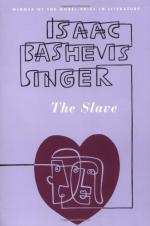|
This section contains 477 words (approx. 2 pages at 300 words per page) |

|
The Slave is a picaresque novel: Jacob is constantly on a journey, moving from one village to another. The author exploits Jacob's restlessness to make important statements about anti-Semitism and the selective observance of the Talmud by Jews. Even when Jacob regains his freedom, he feels compelled to return to the land where he was enslaved. As the book concludes, Jacob returns from Palestine to die in the same place (Pilitz) as his beloved Sarah. In The Slave, Singer portrays Jacob as an Everyman-figure, a prototypical human being on a physical—but also figurative and spiritual— journey.
Similarly, The Slave functions as a bildungsroman, a novel concerning the education and learning experiences of a protagonist. During his journeys, Jacob learns a great deal about gentiles, Jews, human nature, himself, and most importantly, God. Singer's novel concerns one man's exploration of God. Jacob contemplates whether he possesses...
|
This section contains 477 words (approx. 2 pages at 300 words per page) |

|




